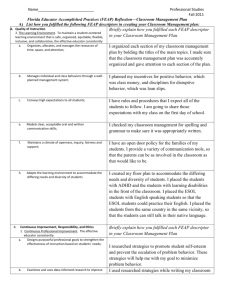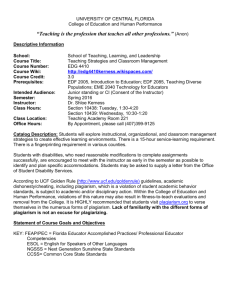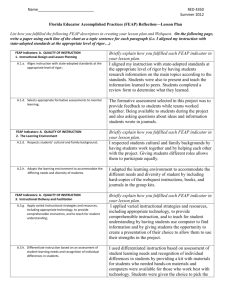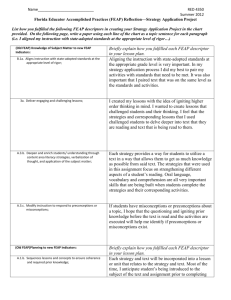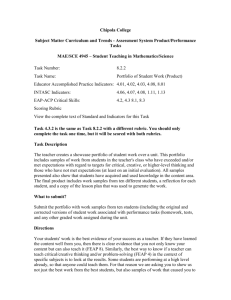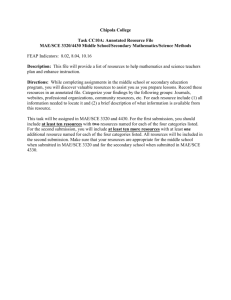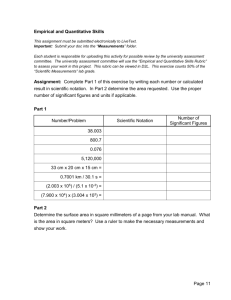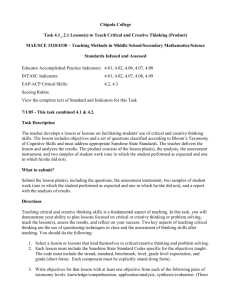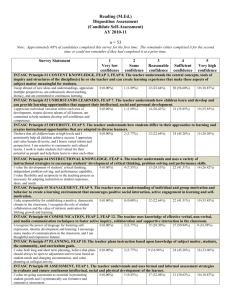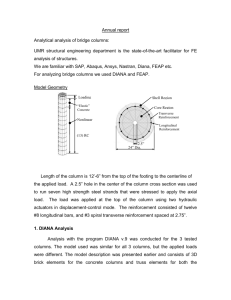UNIVERSITY OF CENTRAL FLORIDA
advertisement
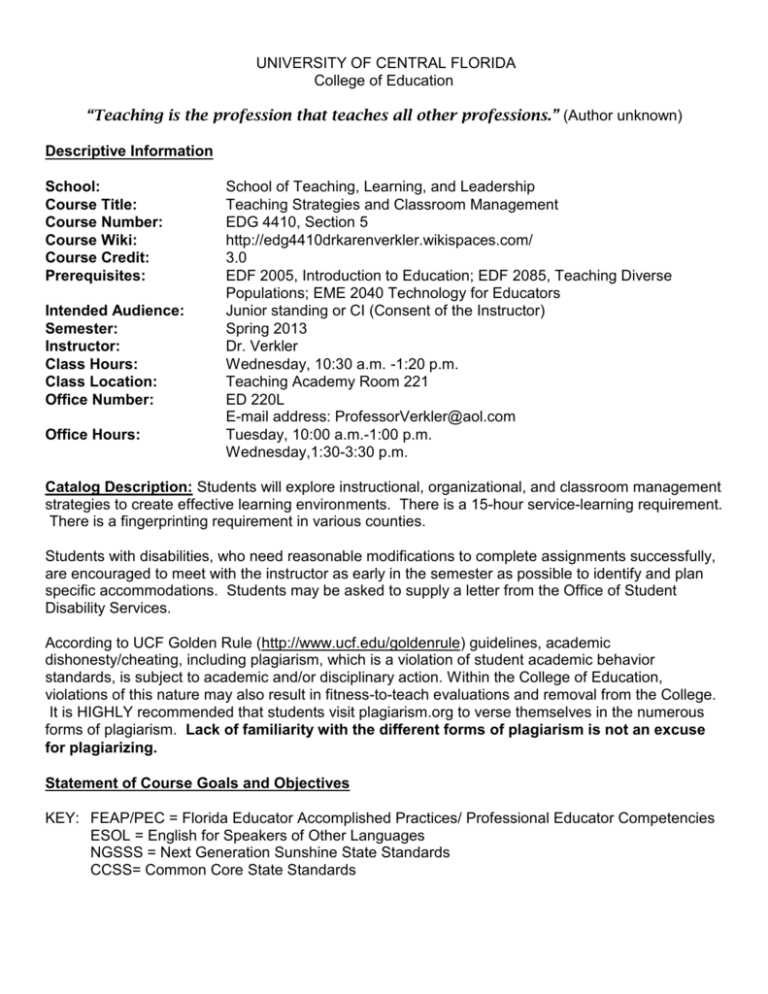
UNIVERSITY OF CENTRAL FLORIDA College of Education “Teaching is the profession that teaches all other professions.” (Author unknown) Descriptive Information School: Course Title: Course Number: Course Wiki: Course Credit: Prerequisites: Intended Audience: Semester: Instructor: Class Hours: Class Location: Office Number: Office Hours: School of Teaching, Learning, and Leadership Teaching Strategies and Classroom Management EDG 4410, Section 5 http://edg4410drkarenverkler.wikispaces.com/ 3.0 EDF 2005, Introduction to Education; EDF 2085, Teaching Diverse Populations; EME 2040 Technology for Educators Junior standing or CI (Consent of the Instructor) Spring 2013 Dr. Verkler Wednesday, 10:30 a.m. -1:20 p.m. Teaching Academy Room 221 ED 220L E-mail address: ProfessorVerkler@aol.com Tuesday, 10:00 a.m.-1:00 p.m. Wednesday,1:30-3:30 p.m. Catalog Description: Students will explore instructional, organizational, and classroom management strategies to create effective learning environments. There is a 15-hour service-learning requirement. There is a fingerprinting requirement in various counties. Students with disabilities, who need reasonable modifications to complete assignments successfully, are encouraged to meet with the instructor as early in the semester as possible to identify and plan specific accommodations. Students may be asked to supply a letter from the Office of Student Disability Services. According to UCF Golden Rule (http://www.ucf.edu/goldenrule) guidelines, academic dishonesty/cheating, including plagiarism, which is a violation of student academic behavior standards, is subject to academic and/or disciplinary action. Within the College of Education, violations of this nature may also result in fitness-to-teach evaluations and removal from the College. It is HIGHLY recommended that students visit plagiarism.org to verse themselves in the numerous forms of plagiarism. Lack of familiarity with the different forms of plagiarism is not an excuse for plagiarizing. Statement of Course Goals and Objectives KEY: FEAP/PEC = Florida Educator Accomplished Practices/ Professional Educator Competencies ESOL = English for Speakers of Other Languages NGSSS = Next Generation Sunshine State Standards CCSS= Common Core State Standards Course Objectives: The student will: Recognize, select, write, and classify behavioral objectives using cognitive, affective, and psychomotor taxonomies and the Next Generation Sunshine State Standards/Common Core Standards. (FEAP 2.a.1.a./PEC 1.6; applicable NGSSS and CCS) Develop differentiated instructional plans that meet the needs of diverse learners. (FEAP 2.a.1.f./PEC 1.3, 1.4, 7.2, 8.2; applicable NGSSS and CCSS, ESOL 3.2.a., 3.2.j., 4.1.c., 4.2.a.) Develop a repertoire of teaching strategies for diverse populations. (FEAP 2.a.1.f./PEC 1.3, 1.4, 7.2; applicable NGSSS and CCSS, ESOL 4.1.c., 3.2.j.) Select and use a variety of curriculum materials that are appropriate to objectives and plans chosen. (FEAP 2.a.3.g/PEC 1.2, 3.7; applicable NGSSS and CCSS) Select and effectively use a wide variety of question types. (FEAP 2.a.3.f, 2.a.2.e/PEC 2.5, 3.6; applicable NGSSS and CCSS) Demonstrate two different types of teaching strategies in a microteaching setting. (FEAP 2.a.3.a., 2.a.3.f, 2.a.3.g; PEC 3.1, 3.6, 3.7, 3.10; applicable NGSSS and Common Core Standards; ESOL 3.2.a., 3.2.j., 3.2.k., 4.1.c., 4.2.a.) Select and use verbal and non-verbal communication effectively. (FEAP 2.a.2.e/PEC 2.5) Choose effective reinforcement techniques. (FEAP 2.a.2.b/PEC 2.2) Structure the classroom effectively. (FEAP 2.a.2.a, 2.a.2.h/PEC 2.1) Know and use a variety of classroom management techniques. (FEAP 2.a.2.b /PEC 2.2) Compare and contrast management discipline systems and create a system for a classroom. (FEAP 2.a.2.b/PEC 2.2) Establish a set of classroom routines and procedures for utilization of materials and movement of students. (FEAP 2.a.2.b/PEC 2.2) Demonstrate knowledge of methods for establishing a safe classroom community and preventing problem behavior, in keeping with the state code of ethics and the principles of professional conduct (FEAP 2.a.2.f /PEC 2.6) Participate in field experiences appropriate for major area of specialization and reflect on the teaching strategies, classroom climate, and behavior management plans in operation in these field experiences. (FEAP 2.a.2.e,2.a.2.f,2.a.3.a,/PEC 3.1; applicable NGSSS and CCSS) Required Texts and Readings Textbook: Jacobsen, D.A., Eggen, P., Kauchak, D. (2009). Methods for Teaching: Promoting Student Learning in K-12 Classrooms (8th Ed.). New Jersey: Allyn & Bacon. Wiki for course materials and current information: http://edg4410drkarenverkler.wikispaces.com/ Supplementary Materials: Flash drive; LiveText at the UCF Bookstore or livetext.com. (Livetext is for education majors only.) Course Expectations - Professionalism/Participation You are being prepared to enter and succeed in the teaching profession. As such, you are expected to possess and exhibit those personal attributes deemed essential to success as a professional educator. These attributes include reflective decision-making, professional commitment, strong interpersonal and communications skills, an appropriate classroom personality, mature emotional makeup, and academic integrity. Students demonstrating inappropriate behavior may be subject to fitness-to-teach evaluations and resultant removal from the College. Students are expected to attend all class and field experience sessions and are accountable for all materials covered. Class attendance and participation are critical for your learning experience. Professionalism and respect are integral to the teaching profession, and consequently, to this class. Your attendance in class is necessary for the successful functioning of our class. If you have to miss class because of illness, seminar obligation, etc., you are required to notify the instructor as soon as possible and provide documentation to substantiate your excuse. Absences and/or consistent tardiness/leaving class early will result in the lowering of your final grade by one letter grade. In addition to the above professionalism and participation, please remember you are accountable and responsible for addressing the FEAP’s (Florida Educator Accomplished Practices) during your entire program at UCF. Addressing an FEAP in another class does not exempt you from maintaining and upholding the quality standards for which the university stands. You are expected at all times to be accountable and responsible. Within the School of Education, violations of the FEAP’s may result in written documentation of the Professional Code of Conduct. New Florida Educator Accomplished Practices (FEAPs) – Adopted 2011 Each effective educator applies the foundational principles through six (6) Educator Accomplished Practices. Each of the practices is clearly defined to promote a common language and statewide understanding of the expectations for the quality of instruction and professional responsibility. The following FEAPs are addressed by the objectives of EDG 4410: A. Quality of Instruction 1. Instructional Design and Lesson Planning Aligns instruction with state-adopted standards at the appropriate level of rigor FEAP 2.a.1.a. Designs instruction for students to achieve mastery FEAP 2.a.1.c Develops learning experiences that require students to demonstrate a variety of applicable skills and competencies FEAP 2.a.1.f. 2. The Learning Environment Organizes, allocates, and manages the resources of time, space, and attention 2.a.2.a Manages individual and class behaviors through a well-planned management system FEAP 2.a.2.b. Conveys high expectations to all students FEAP 2.a.2.c. Respects students’ cultural linguistic and family background FEAP 2.a.2.d. Models clear, acceptable oral and written communication skills FEAP 2.a.2.e. Maintains a climate of openness, inquiry, fairness and support FEAP 2.a.2.f. Adapt the learning environment to accommodate the differing needs and diversity of students FEAP 2.a.2.h. Utilizes current and emerging assistive technologies that enable students to participate in highquality communication interactions and achieve their educational goals FEAP 2.a.2.i. 3. Instructional Delivery and Facilitation Delivers engaging and challenging lessons FEAP 2.a.3.a. Relate and integrate the subject matter with other disciplines and life experiences FEAP 2.a.3.e. Employ higher-order questioning techniques FEAP 2.a.3.f. Applies varied instructional strategies and resources, including appropriate technology, to provide comprehensible instruction, and to teach for student understanding FEAP 2.a.3.g. B. Continuous Improvement, Responsibility and Ethics 1. Continuous Professional Improvement Collaborates with the home, school and larger communities to foster communication and to support student learning and continuous improvement FEAP 2.b.1.d. Engages in targeted professional growth opportunities and reflective practices FEAP 2.b.1.e. 2. Professional Responsibility and Ethical Conduct Adheres to the Code of Ethics and the principles of Professional Conduct of the Education Profession of Florida and fulfills the expected obligations to students, the public and the education profession FEAP 2.b.2 Additional Course Expectations 1. Use of cell phones (talking and texting) during class is disrespectful, distracting, and unprofessional. While class is in session, cell phones are to be TURNED OFF AND PUT AWAY. Using cell phones during class communicates to the instructor and your peers that you feel as though you have better things to do than to listen to and learn from your instructor and your peers. Students wanting to use their phones must do so during break or outside of the classroom. 2. Use of profanity and foul inappropriate language is disrespectful, offensive, and unprofessional. 3. Class notes, documents, rubrics, resources, announcements, and other supplementary material are available at the course wiki at http://edg4410drkarenverkler.wikispaces.com/ Students are to download and/or print out documents from files on the course wiki. It is your responsibility to check the wiki AND your email before class each week to ensure you are ready with the appropriate materials for class. 4. Communication between the instructor and students will be via email (ProfessorVerkler@aol.com) and the course wiki. It is your responsibility to check your email and the course wiki on a regular basis. Your lack of following through on this responsibility is not a valid excuse for not fulfilling course assignments. 5. Students are expected to complete reading assignments before each class meeting. Students should come to class prepared to make relevant contributions to class discussions and activities based on assigned readings. 6. Assignments are due at the beginning of class on the date indicated in the syllabus. Grades will be lowered 20% (of total points possible) for assignments turned in late. Assignments late more than one week past the due deadline will not be accepted. Assignments may be turned in early. If you are absent, it is your responsibility to get any missed work and turn in any assignments that are due. An absence DOES NOT change the assignment’s due date. Technical/computer problems are not an acceptable excuse for a late assignment. Do not wait until the due date to print out your assignment. 7. Most of the assignments are to be submitted with a rubric. This syllabus clearly indicates which assignments are to be accompanied by a rubric. The rubric is vital for the instructor’s evaluation of your assignment. The rubrics are found on the course wiki. Grades for assignments turned in without the rubric will be lowered 20% (of total points possible). 8. Your preparedness reflects your degree of professionalism. As such, your assignments are to be submitted with all components stapled together. The rubric with your name and any other required information on it is to be STAPLED to the front of your assignment. Work submitted should look professional; it should not look as though it was thrown together with little thought. Dog-eared and unstapled work will be returned and the grade will be lowered 20% of total points possible. The instructor will not have a stapler. 9. All assignments must be word processed (typed). In addition, all assignments are to be submitted free of spelling, grammatical, and typographical errors. Make sure to proof any submitted work or have someone else proof your work before you turn it in. The University Writing Center, phone number 407-823-2197, is also available for student assistance in writing, proofing, and editing. Their Web site is http://www.uwc.ucf.edu. 10.Work is expected to be thoughtful, reflective, and of high quality in terms of both content and presentation. Work that does not meet the established criteria will be noted and will not receive full credit. Academic Course Requirements The instructor has samples of most of the course assignments. You may view these samples before and after class, during class breaks, and/or during the instructor’s office hours. It is highly recommended that you refer to them as a guide in completing your assignments. The feedback on your assignments will often be given in the form of editorial symbols, the decoding of which may be found at http://webster.commnet.edu/writing/symbols.htm. 1. Junior Achievement Training. All students will attend one of the training sessions listed below. This course has a required in-school experience. During this 15-hour placement, you will be teaching 5-6 life skills/economics education lessons. To prepare for this experience each student must attend a training session outside of class time. You will select one of the following training sessions: UCF’s Orlando campus – Morgridge International Reading Center o Tuesday, January 29, 2013, 10:30 AM –1:20 PM o Wednesday, January 30, 2013, 10:30 AM–1:20 PM 2. Résumé. Students will prepare a professional résumé. 3. Curriculum Materials Center (CMC) Orientation. Students will complete an orientation to the Curriculum Materials Center (CMC) that introduces the services and collections of the CMC. The CMC orientation consists of an overview of the CMC, the production lab, using the catalog to find items in the CMC, and the collection. Students will visit the CMC to complete the orientation worksheet. 4. Microteaching and Professional Development Plan (FEAP 2.a.3.a., 2.a.3.f., 2.a.3.g., PEC 3.1, 3.6, 3.7, 3.10, ESOL 3.2.a., 3.2.j., 3.2.k., 4.1.c., 4.2.a.) Students will participate in two microteach experiences, which will be recorded during the class. Microteach I is a direct teach with a poster. A student-designed lesson plan is to be submitted for Microteach I. The Microteach I lesson plan will ultimately be uploaded into the student’s LiveText professional portfolio. The plan will be developed in conjunction with the ESOL Module, which provides guidelines for its construction. Microteach 2 is an indirect teach with an instructional aid. This lesson will incorporate teaching strategies, instructional materials, questioning skills, and modifications made for special needs and culturally and linguistically diverse students. Students will view their performance and write a professional development plan for addressing problematic areas. Unprofessional behavior (e.g., lacking instructional materials and dressing unprofessionally, etc.) will result in a loss of 5 points from the assignment affiliated with each microteach (i.e., the Microteach I Lesson Plan for Microteach I and the Professional Development Plan for Microteach II). 5. Exams/Assessments The exam/assessment options may include objective tests, presentations, reflections, essays, portfolios, etc. addressing concepts from lectures, video presentations, class activities, discussions, assignments, guest speakers, and the assigned readings. 6. ESOL Module (ESOL 3.2.a., 3.2.j., 3.2.k., 4.1.c., 4.2.a; PEC 7.2, 8.2) Students will complete the EDG 4410 ESOL (English for Speakers of Other Languages) Module. Use the Microteach I lesson plan template on the course wiki, not the one provided in the EDG 4410 module. The ESOL module can be found online at the following address: http://education.ucf.edu/stll/esol.cfm The completed assignment is to be submitted with the “Microteach #I Lesson Plan Template/Rubric from the course wiki. This assignment must be uploaded to Livetext by the specified deadline. Failure to meet the deadline will result in losing half of the points of the total assignment. When the assignment is returned with instructor feedback, elementary education, exceptional education, and secondary English language arts education majors will need to place it in their TESOL notebook. For comprehensive information about the TESOL Notebook, visit the following website: http://connect.rc.ucf.edu/p97824934/. 7. Communication with Families: Letter/Newsletter/Syllabus (FEAP 2.a.2.e./PEC 2.5) Students will compose a communication to the families of their future students. This assignment will take the form of a letter, newsletter, or syllabus. The communication should explain how the teacher would build a climate for learning, including class rules and his/her classroom management plan. It should also include the items listed on the corresponding rubric. This assignment is to be submitted with the appropriate rubric. Secondary majors will create a syllabus. Elementary majors will write a letter or newsletter. K-12 majors, depending on the grade level they wish to eventually teach, will create a syllabus or newsletter/letter. This assignment must be uploaded to the Letter/Newsletter section of Livetext by the specified deadline. Failure to meet the deadline will result in losing half of the points of the total assignment. 8. LiveText Pre-Professional Portfolio (FEAP 2.a.1.a., 2.a.1.f./PEC 2, 10) Using LiveText, students will begin to compile a pre-professional portfolio, which is a graduation requirement. At the beginning of the semester, students must go to the Curriculum Materials Center (CMC) for assistance in creating their Livetext Portfolio. Students will need to bring their LiveText registration number with them to the orientation session. Students can also access http://education.ucf.edu/livetext/create_portfolio.cfm for additional Livetext assistance. The following FEAPs (and corresponding assignments) will be addressed in this class: Instructional design and planning: Microteach I Lesson Plan Models clear, acceptable oral and written communication skills: Communication with Families – Letter, Newsletter, or Syllabus The following assignments* must be uploaded to LiveText by the specified deadline. Failure to meet this deadline will result in losing half of the total points of the assignment. Microteach I Lesson Plan Communication with Families – Letter/Newsletter/Syllabus *A clean copy of each assignment (without rubrics) is to be uploaded. 9. Service-Learning (FEAP 2.a.2.e., 2.a.2.f., 2.a.3.a./PEC 3.1; applicable NGSSS and CCSS) All students will participate in 15 hours of volunteer work in a school setting. Five of the hours will involve teaching five Junior Achievement lessons. Students with criminal arrest records must see the instructor immediately to discuss how their history may impact their ability to complete this course and to eventually become a teacher. Students enrolled in other EDG or EDF courses requiring a field experience may NOT use the same hours for both experiences. EDG 4410 is a UCF sanctioned service-learning class. Students will spend a minimum of fifteen hours throughout the course volunteering in an educational setting. This activity will address a need in the community, support the course objectives, involve a connection between the campus and the community, and involve structured student reflection. Students will spend time reflecting on their service-learning experiences through ongoing structured classroom discussions related to each course topic and a meta-reflective project. Servicelearning efforts will be the core of much of the learning in the course. The "grade" for the service-learning requirement will come from the tangible class-related project and discussions, rather than simply from completion of the 15-hour minimum requirement. Service-learning experiences can assume many different forms. To meet the objectives of the course, our activities will address the following needs of our educational communities: Need for special assistance for students in schools, especially high risk Additional help in preparation for the FCAT Classroom management/proximity control by adults Role models/mentors from diverse ethnic, linguistic, and socioeconomic backgrounds Increased civic knowledge and awareness via Junior Achievement lessons Working with ESOL students – This is highly recommended for students in the areas of early childhood education, exceptional education, elementary education, and English Language Arts. Students and classroom teachers must complete a UCF Service-Learning Contract (on the course wiki) listing the activities planned for this experience. No student will be expected to work on a project to which she or he has significant religious, political, or moral objections. It is the student’s responsibility to let the instructor know about such objections. Teachers will complete a Service-Learning Evaluation giving feedback to the UCF student and documenting the hours completed. This document is also on the course wiki. 10. Final Class Project: Classroom Management (FEAP/PEC 2, 9, 11) Students will be given their choice of final class project. They can either: (1) individually create a service learning artifact (PowerPoint, Prezi, or Glog, or some other multimedia presentation) and do an oral presentation that focuses on various aspects of classroom management in the service-learning classroom OR (2) individually or in groups share in a workshop format with the entire class a classroom management strategy by demonstration and handouts. (See the detailed descriptions on a subsequent page of this syllabus.) 11. HAPPY Hour Student Showcase Attendance. HAPPY (Having Active Participation Prepares You) Hour is an opportunity for professional development for UCF’s undergraduate education majors/minors. HAPPY Hour consists of monthly workshops conducted by College of Education and K-12 experts in areas of interest to our students. The workshops are free and require no pre-registration. Students simply show up, learn, have fun, and leave with tons of resources. A schedule of the 2012-2013 HAPPY Hour workshops can be found at http://education.ucf.edu/happyhour. Students are encouraged to attend the workshops to enhance their credentials as educators. The workshops attended can be added to the “Professional Development” section of the students’ ever-growing professional résumés. HAPPY Hour also includes the HAPPY Hour Student Showcase, an in-house conference that highlights teacher candidates as the presenters. This year’s Showcase will be Saturday, January 26, 2013, from 8:30-4:00 p.m. On-line registration is $10.00. On-site registration (the day of the Showcase) is $15.00. To qualify for door prizes, register online by Monday, January 21, 2013, at http://education.ucf.edu/happyhour/register.cfm. Payment must be received by Monday, January 21, 2013. In lieu of taking Exam 1, students have the option of attending the ENTIRE HAPPY Hour Student Showcase. Students attending the Showcase will submit an artifact (presentation handout) and a reflection in which they will reflect on the entire Showcase or on a particular presentation that made a significant impact on them. In their reflection, students will discuss what they learned from the Showcase and/or presentation and how they might apply what they learned once they have their own classroom. A reflection is NOT a narrative of what the presenter did and/or said. In a reflection, students demonstrate that they have gleaned something meaningful from the presentation and have given critical thought regarding how they might be able to use/implement what they learned in their future classroom/career. FINAL PROJECT OPTIONS You have a choice of final project. Described below are the two options. I will describe them in further detail as we progress through the semester. Time limit for each person is 5-10 minutes. Option One – This option is to be completed and shared individually. You will complete a PowerPoint, Prezi, Glog, or other digital artifact of your service learning and/or Junior Achievement experiences. The criteria for this option are specified on the rubric on the course wiki. You will address ALL criteria specified on the rubric. I will split up the class into four groups (not necessarily your microteach groups) and each group will go into one of the four microteach rooms. Each person choosing Option One will share their artifact with their group during a 5-10-minute presentation (refer to the rubric about what needs to be discussed during your presentation). After your presentation, you will leave the microteach room and your peers will evaluate you on your artifact and presentation. They will indicate their evaluation on your rubric, which will then be turned in to me. I will have the final say regarding the grade you earn. This process will continue until all Option One students have shared their artifacts. ________________________________________________________________________________ Option Two – This option can be done either individually or in groups (as many as three people can be in a group.) Do NOT present with others if your topic is so simple to explain that an additional person is not warranted. This option gives you a SMALL taste of the steps that HAPPY Hour Student Showcase student presenters experience on the way to and through presenting at the Showcase. The criteria for this option are specified on the three-page rubric entitled “FINAL PROJECT: Classroom Management Handout and Presentation RUBRIC” on the course wiki. Since there are several different steps to presenting a presentation/workshop, there are several different parts to this assignment. By the way, you will NOT actually be submitting a proposal to present at the HAPPY Hour Student Showcase. However, for those of you who think you might like to do so in the future, this is a great way to get a taste of what the presenters have to do. Your presentation MUST be about classroom management strategies and must be interactive. You can share things you research, things you learned in any of the HAPPY Hour Student Showcase presentations and/or HAPPY Hour workshops, any of your classes, service learning and Junior Achievement experiences, etc. Remember, teaching is about borrowing ideas that have worked for others. You will fill out the Presentation Proposal Form in your course syllabus. You will not submit the form electronically. You will create a handout for class distribution. (The handout does not have to be in color.) You will then present your presentation to our entire class. Refer to Presentation part (Part C) of the rubric. Your evaluation will be conducted by me. Course Evaluation Assignment Date Due Points Worth Rough draft of Résumé Résumé HAPPY Hour Student Showcase handouts & reflection OR Exam 1 CMC Orientation Worksheet Rough draft of Microteach I Lesson Plan EDUCATION MAJORS ONLY: Upload clean copy of Microteach I Lesson Plan (without rubric) to Livetext. January 23 January 30 January 30 OR February 6 February 13 February 13 February 20 Microteach I Lesson Plan -with rubric February 20 Rough draft of Microteach II Lesson Plan Service Learning Contract Microteach II: Indirect Teach Microteach II Professional Development Plan -with rubric and Microteach II Lesson Plan March 13 March 20 March 20 March 27 EDUCATION MAJORS ONLY: Upload clean copy of Letter, Newsletter, or Syllabus (without rubric) to Livetext. April 3 Letter, Newsletter, OR Syllabus -with rubric Final Project -with rubric Service Learning Evaluation Exam 2 TOTAL POINTS April 3 -20 25 OR 25 10 -If deadline is not met, then ½ of total points of the assignment will be deducted. 35 (Unprofessional behavior will result in a 5-pt deduction from the total pts.) -10 -22 (Unprofessional behavior will result in a 5-pt deduction from the total pts.) If deadline is not met, then ½ of total points of the assignment will be deducted. 20 April 10 April 17 April 17 April 24 Points Earned 40 10 25 217 The grading system, which will not include plusses or minuses, is as follows: A = 201-217 points B = 184-200 points C = 164-183 points D = 149-163 points F = Below 149 points Misrepresentation of Work You may not use papers or activities written by former students to satisfy course requirements. Use of prior work will be considered cheating and will result in an automatic course grade of F. Misrepresenting actual work completed (e.g., a classmate’s work, materials from the Internet, etc.) as yours will also be considered cheating and will result in a failing course grade. Within the College of Education, violations of this nature may also result in fitness-to-teach evaluations. Z Designation for Academic Dishonesty (information below quoted from http://www.z.ucf.edu) A Z designation for academic dishonesty has been approved by the University Undergraduate Policy and Curriculum Committee of the Faculty Senate. Adopting the Z designation reaffirms the importance of civic responsibility by faculty and students to ensure that degrees earned at UCF are of high quality and subject to clear and high standards. If a student engages in academic dishonesty in a course, the grade that the student earns for the course will be preceded by the letter Z. Tentative Class Schedule Check our course wiki at http://edg4410drkarenverkler.wikispaces.com/ AND your email WEEKLY for class materials, announcements, and the most current information! Date Agenda/Assignment January 9 Introductions and organization of course Professionalism and fitness to teach Chapter 1: Teaching in an Era of Standards and Accountability January 16 Professional Résumé Domains of learning/higher level thinking Chapter 4: Standards and the Goals of Instruction Junior Achievement: Placement and training date selection ________________________________________________________________________________ January 23 Rough draft of résumé is due. Planning – goals and outcomes for instruction; unit and lesson planning Chapter 5: Formulating Goals and Objectives Using Standards Chapter 6: Planning for Assessment with Standards Introduction to Microteach I ________________________________________________________________________________ January 26 HAPPY Hour Student Showcase (attendance is optional) 8:30 a.m. – 4:00 p.m. Education Complex Building, Teaching Academy, and the Morgridge International Reading Center ________________________________________________________________________________ January 30 Résumé is due. HAPPY Hour Student Showcase reflections and handouts are due from students seeking exemption from Exam 1. Chapter 8: Meeting Standards Through Teacher-Centered Instructional Strategies (pp. 222-237) Direct Teach: Microteach I Lesson Plan Interdisciplinary Planning ________________________________________________________________________________ February 6 Exam 1 Chapter 10: Building on Learner Differences: Instructional Strategies Introduction of ESOL Module website: http://education.ucf.edu/stll/esol.cfm ESOL Strategies: ESOL Simulation February 13 Rough draft of Microteach I Lesson Plan is due for peer editing. Swap Microteach I lesson plans: Peer editing Microteach I procedures Curriculum Materials Center (CMC) Orientation: http://library.ucf.edu/CMC/Orientation Bring the CMC Orientation Worksheet to class. The CMC Orientation Worksheet is due at the end of class. February 20 Microteach I: Direct Teach with a poster Microteach I Lesson Plan and rubric are due. EDUCATION MAJORS: Upload a clean copy of the Microteach I Lesson Plan (without the rubric) to LiveText. ________________________________________________________________________________________ February 27 Chapter 7: Questioning Strategies in an Era of Standards & Accountability Chapter 8: Meeting Standards through Teacher-Centered Instructional Strategies (pp. 237-248) Questioning Strategies, Indirect teaching strategies, Indirect teach demo Microteach II lesson plan ________________________________________________________________________________________ March 6 Spring Break! Let’s go to the beach! March 13 Rough draft of Microteach II lesson plan is due. Swap Microteach II lesson plans: Peer editing Professional Development Plan March 20 Microteach II: Indirect Teach with instructional aid. Service learning contract is due. March 27 Microteach II Professional Development Plan and Rubric are due. Chapters 2 and 3: Classroom Management Establishing a learning climate: communicating expectations, procedures, rules, classroom layout, climate, routines and procedures, first day/week. Classroom Management Style Guest speaker: Building a climate for learning April 3 Letter/Newsletter/Syllabus and Rubric are due. EDUCATION MAJORS: Upload a clean copy of the Letter/Newsletter/Syllabus (without the rubric) to LiveText. Classroom Management Theories Classroom Management Style ________________________________________________________________________________________ April 10 Final Projects: Classroom Management Presentations. April 17 Service Learning Evaluation is due. Final Projects: Classroom Management Presentations. April 24 Exam 2 Interviewing for a teaching position: Guest speaker – Principal Student Information Sheet Name__________________________________________ Course ________ _EDG 4410____ Student PID______________________________________ Section _________________________ Address _____________________________________ ________________________ Phone(s) _____________________________________ _______________________ _____________________________________ _______________________ E-mail Address ____________________________________________________________________ Major___________________________________________________________________________ _ Year in College (Jr., Sr., etc.)_________________________________________________________ Please state future personal and/or educational/vocational goals. ________________________________________________________________________________ ________________________________________________________________________________ Please list your hobbies/interests. ________________________________________________________________________________ ________________________________________________________________________________ Please indicate what you hope to gain from this class. Please tell me why you want to become a teacher. (You may continue your response on the back of this page.)
